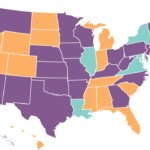The society is helping Maryland rheumatologists navigate the state’s unique healthcare financing model, which sets statewide rates for all insurers for any service provided at hospitals.


The society is helping Maryland rheumatologists navigate the state’s unique healthcare financing model, which sets statewide rates for all insurers for any service provided at hospitals.

The increased use of telemedicine that began in 2020 at the start of the COVID-19 pandemic will continue to provide new ways to expand patient care in rheumatology.

The 2022 Rheumatic Disease Report Card found that many states can improve access to care, affordability & activity for their residents living with rheumatic diseases.

Kurt Blake, MBBS |
Saddle Nose & Cauliflower Ear Deformities in Relapsing Polychondritis These images depict a 32-year-old man who presented with five weeks of left-sided hearing loss, weight loss and discomfort in the nose, ear, chest wall and knee. He had an erythrocyte sedimentation rate (ESR) of 120 mm/hr, and a C-reactive protein level of 225.4 mg/L. The…

Beenish Zulfiqar, MD |
It’s 11 a.m. on a Wednesday. You see a new patient in your fellow’s clinic with impressive physical findings, including a prominent skin rash and deforming arthritis. The patient has been to many doctors and is frustrated that her condition remains undiagnosed and untreated. You thoroughly examine the patient, present her case to your attending…

Hurricane Ida intensified in the last two weeks of August 2021, battering the Cayman Islands and Cuba before hitting the Louisiana coast as a Category 4 storm just before Labor Day weekend.1 At landfall, Ida blasted southern Louisiana with maximum sustained winds of 150 knots, then turned in a north-northwestern direction to hit the New…

I wouldn’t normally look to professional basketball as a model for healthcare, but sometimes answers come from unexpected places. The observation that elite athletes are not like you and me—medically speaking—is not new. In the second century AD, the pontifex maximus in Pergamum recognized this fact and appointed Claudius Galen physician to the gladiators, making…

At my first Advocacy Leadership Conference as a member of the ACR’s Insurance Subcommittee, I discovered the power of stories from the clinic and how lawmakers value clinicians’ input on healthcare legislation.

The Washington Rheumatology Alliance is focused on creative ways to increase the rheumatology workforce to meet the demand for care, such as instituting clinical rotations in rheumatology for nurse practitioner programs and advocating for pediatric rheumatologist loan forgiveness.

The growing rheumatologist workforce shortage has loomed over the profession, threatening to undercut the delivery of care to the increasing number of patients with rheumatic conditions. “The workforce shortage is an existential threat to the field of rheumatology and to the care we deliver to our patients,” says ACR President Kenneth Saag, MD, who lauded…